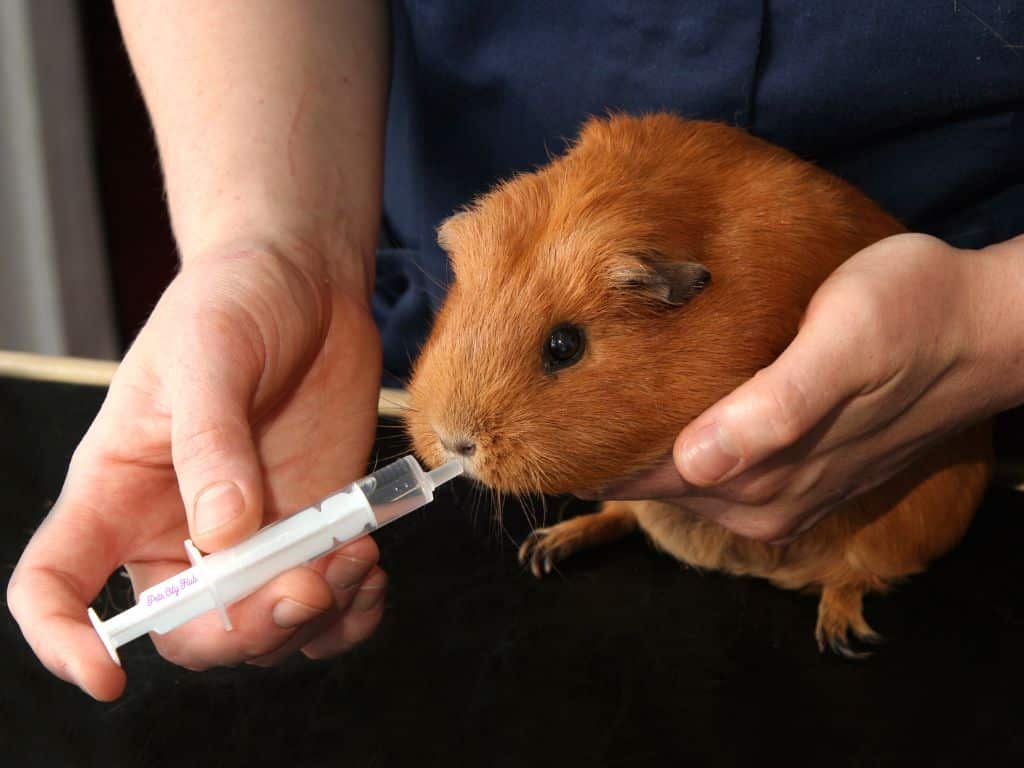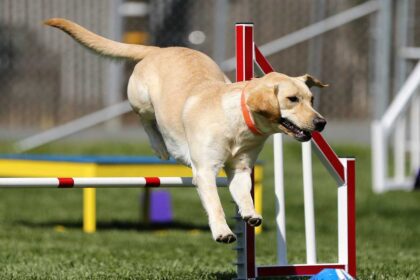Cuddle-worthy and full of personality, guinea pigs have captured the hearts of many pet lovers. These adorable little cavies are relatively low-maintenance companions, but like any pet, they can experience health problems. The key to keeping your guinea pig happy and healthy for years to come lies in early detection of any issues.
Just like us, guinea pigs can’t tell us exactly how they’re feeling, so it’s our responsibility as their caregivers to be observant and recognize signs of illness. By familiarizing yourself with common symptoms and potential health concerns, you can take swift action and ensure your furry friend gets the veterinary care they need to live a long and fulfilling life.

Signs and Symptoms of Common Guinea Pig Ailments
Here’s a breakdown of common signs of illness in guinea pigs with slightly more detailed explanations of what they might indicate:
Changes in Eating (eating less or more than usual)
A sudden decrease in appetite can be a cause for concern, especially if your guinea pig is normally a hearty eater. This could be a sign of digestive problems like nausea or pain caused by an underlying illness. Conversely, a sudden increase in appetite might seem positive, but it could indicate dental issues that make chewing difficult, causing them to eat more frequently to compensate for smaller bites.
Lethargy or Unusual Behavior
Guinea pigs are naturally curious and active creatures. If your furry friend seems unusually sluggish, spends most of their time hiding, or displays a lack of interest in their usual activities, it could be a sign of pain, discomfort, or even depression. A change in their typical personality might be their way of communicating that something isn’t right.
Difficulty Breathing
Wheezing, labored breathing, or open-mouthed breathing are all signs that your guinea pig is struggling to breathe. This could be caused by a respiratory infection, allergies, or even foreign objects lodged in their nasal passages. Urgent veterinary attention is necessary in such cases.
Changes in Weight
Sudden weight loss in guinea pigs is a red flag and shouldn’t be ignored. It can be a symptom of various illnesses, including digestive problems, diabetes, or even tumors. Weight gain, while less concerning initially, could indicate dental problems that make chewing difficult, leading them to eat less nutritious foods that are higher in calories. A gradual and unexplained weight change in either direction warrants a visit to the vet.
Wet Fur Around the Eeyes or Nose
Allergies, similar to those in humans, can lead to watery eyes and a runny nose in guinea pigs. Respiratory infections can also cause wet fur around the eyes and nose due to discharge. In some cases, wet fur around the eyes might indicate dental problems that are affecting their tear ducts, causing tears to overflow.
Swollen or Red Eyes
Redness and swelling in the eyes can be caused by eye infections, allergies, or even injuries. If your guinea pig seems to be squinting or pawing at their eyes, it’s important to see a vet to determine the cause and get proper treatment.
Wheezing or Coughing
Similar to difficulty breathing, these symptoms are indicative of respiratory problems. Wheezing sounds like a high-pitched whistling noise during inhalation or exhalation, while coughing might sound like a hacking sound. These symptoms require a prompt visit to the vet for diagnosis and treatment.
Diarrhea or Constipation
Digestive issues in guinea pigs can be caused by a variety of factors, including dietary changes, bacterial infections, or even parasites. Diarrhea can lead to dehydration, while constipation can cause discomfort and prevent them from eliminating waste properly. If your guinea pig experiences changes in their bowel movements for more than a day, consulting a vet is essential.
Skin Problems
Mites, lice, fungal infections, or allergies can all manifest as irritated, itchy skin. You might notice signs of scratching, hair loss, or red, inflamed patches of skin. If you see any of these signs, it’s important to see a vet for diagnosis and treatment to prevent further discomfort and potential complications.
Remember, early detection is key. By familiarizing yourself with these common signs of illness, you can take swift action and ensure your guinea pig receives the veterinary care they need to live a long and healthy life.

Common Guinea Pig Diseases
Vitamin C Deficiency (Scurvy)
Guinea pigs, unlike humans and some other mammals, cannot synthesize vitamin C internally, making it crucial for their diet. Scurvy arises from a deficiency in this essential nutrient. Without adequate vitamin C, guinea pigs suffer from weakened collagen production, manifesting in symptoms such as lethargy, rough coat, swollen joints, bleeding gums, and loss of appetite.
Prevention primarily revolves around providing a balanced diet rich in vitamin C sources, including fresh fruits like oranges, strawberries, and kiwi, as well as vegetables such as bell peppers, kale, and broccoli. Additionally, offering pelleted food fortified with vitamin C ensures they receive sufficient amounts to stave off this debilitating condition.
Respiratory Infections
Respiratory infections in guinea pigs are often triggered by various pathogens like bacteria, viruses, or fungi. These infections can occur due to poor ventilation, stress, or exposure to sick animals. Symptoms typically include sneezing, coughing, nasal discharge, labored breathing, and lethargy.
Prevention entails maintaining a clean and well-ventilated living environment, minimizing stressors, and promptly isolating and treating any guinea pigs showing respiratory symptoms. Regular veterinary check-ups can also aid in early detection and treatment of potential respiratory issues.
Gastrointestinal Problems (Ileus)
Ileus, or gastrointestinal stasis, refers to a condition where the digestive system slows down or halts altogether. It can stem from various factors such as stress, an improper diet lacking in fiber, dental problems leading to difficulty chewing, or even pain.
Manifestations of ileus include decreased or absent appetite, bloating, and reduced fecal output. Prevention strategies revolve around providing a high-fiber diet, with the cornerstone being unlimited access to fresh hay, supplemented by fresh vegetables and limited amounts of high-quality pellets.
Regular dental check-ups and prompt veterinary attention at the first signs of gastrointestinal distress are crucial to managing and preventing more severe complications.
Dental Problems (Overgrown teeth)
Guinea pigs have continuously growing teeth, and if their diet lacks adequate roughage to wear down these teeth, they can develop overgrowth. Overgrown teeth can cause discomfort, pain, and difficulty eating, leading to weight loss and other health issues. Prevention involves providing a diet high in fiber, such as hay, to encourage natural chewing and wearing down of the teeth. Regular veterinary check-ups are essential for early detection and correction of dental issues.
Uterine and Ovarian Diseases
Uterine and ovarian diseases, such as uterine tumors or ovarian cysts, are relatively common in female guinea pigs. These conditions can lead to symptoms like vaginal discharge, lethargy, loss of appetite, and abdominal pain. Spaying female guinea pigs at a young age can significantly reduce the risk of these diseases. Regular veterinary examinations can help detect any abnormalities early on and facilitate appropriate treatment.
Skin Parasites (Mites, Lice)
Guinea pigs are susceptible to infestations by external parasites like mites and lice, which can cause intense itching, hair loss, skin irritation, and in severe cases, skin infections. These parasites can be transmitted through contact with contaminated bedding, other infected animals, or even from the environment. Prevention involves keeping the guinea pig’s living quarters clean and ensuring regular grooming. Treatment typically includes topical or oral medications prescribed by a veterinarian.
Bladder Stones (Uroliths)
Bladder stones, or uroliths, are mineral deposits that form in the bladder and urinary tract of guinea pigs. These stones can cause symptoms such as blood in the urine, difficulty urinating, straining, and discomfort. The formation of bladder stones can be influenced by factors like diet, genetics, and hydration levels.
Preventive measures include providing a balanced diet low in calcium and ensuring access to fresh water at all times. Regular veterinary check-ups can help monitor urinary health and detect any signs of bladder stones early, facilitating appropriate management strategies.
What Measures to Take for a Sick Guinea Pig
If you suspect your guinea pig isn’t feeling well, don’t hesitate. See a veterinarian immediately. While waiting for your appointment, prioritize their comfort. Move them to a quiet, draft-free area with a soft towel for bedding. Make sure they have access to fresh and clean water at all times.
Avoid handling them excessively, as this can cause stress. At the vet’s, expect a thorough examination, which might include feeling their belly, listening to their lungs, and checking their teeth. Depending on the diagnosis, treatment could involve medications, dietary changes, or even surgery in some cases.
How to Prevent Guinea Pig Illness
An ounce of prevention is worth a pound of cure, and that holds true for your guinea pig’s health too! The foundation of a healthy life lies in their environment. Provide a spacious cage with clean, absorbent bedding (like fleece or recycled paper) changed regularly to minimize ammonia buildup.
A balanced diet is key. Offer fresh hay daily as their dietary staple, supplement with a variety of guinea pig-safe vegetables, and provide a measured amount of high-quality pellets formulated for their needs. Don’t forget fresh, clean water at all times. Regular cage cleaning and spot cleaning throughout the week are essential for hygiene.
Finally, schedule regular checkups with your veterinarian. These preventive checkups allow early detection of any potential issues and ensure your furry friend lives a long and happy life.
In Summary
By being a keen observer of your guinea pig’s behavior and health, you can become their champion. Early detection of any signs of illness, like changes in appetite, lethargy, or breathing difficulties, is crucial for prompt veterinary intervention and a speedy recovery. Remember, prevention is key.
Providing a clean environment, a balanced diet, and regular checkups with your vet go a long way in ensuring your cuddly cavy enjoys a long and healthy life by your side. So cuddle them close, watch over them with love, and together, create a lifetime of happy squeaks and wheeks.













